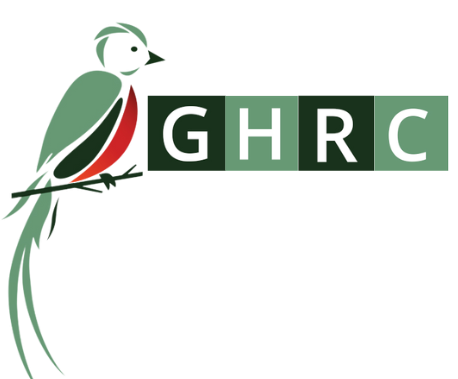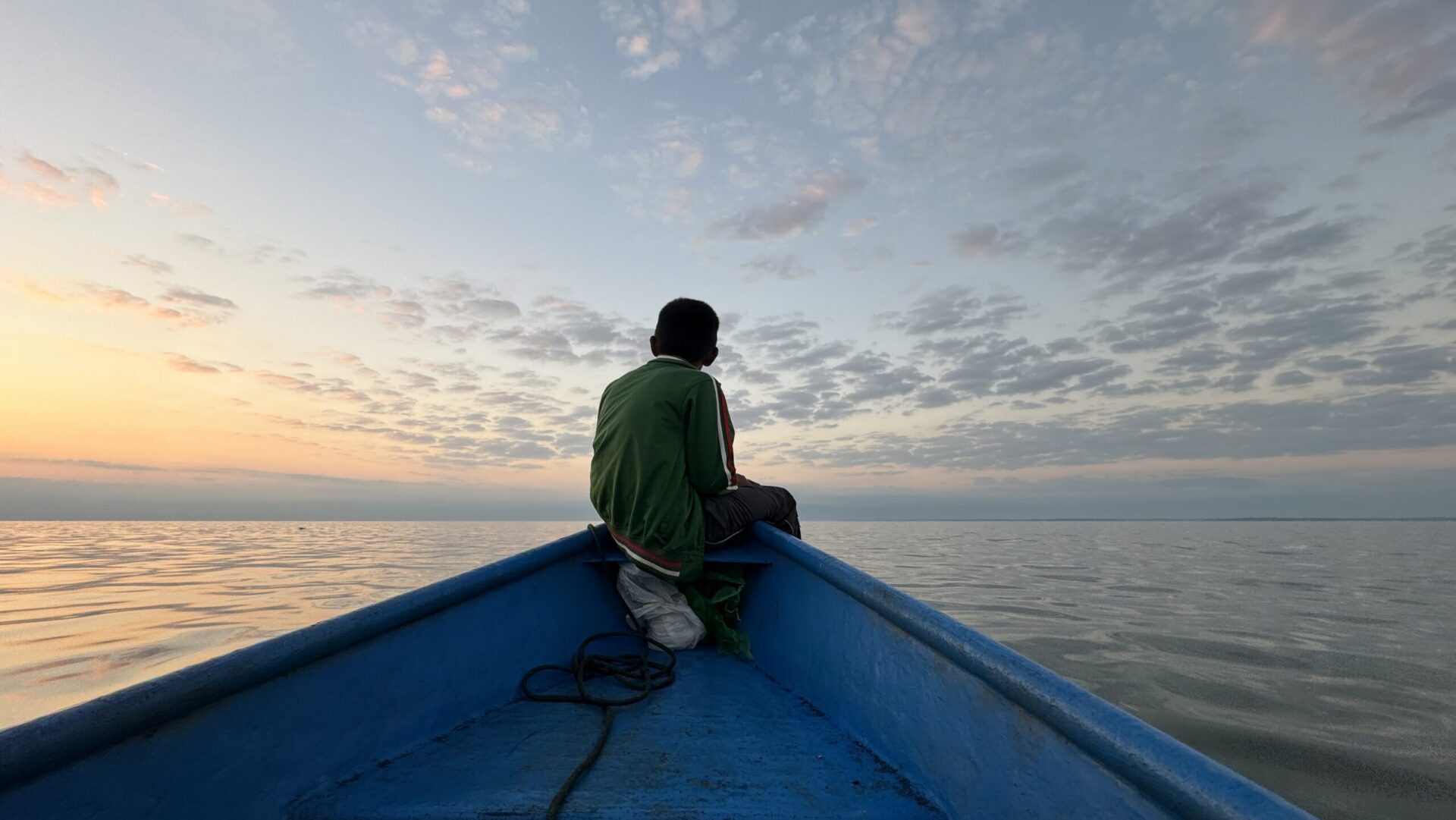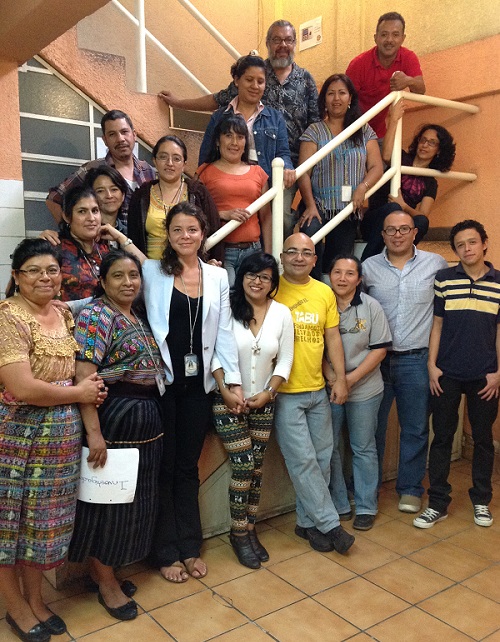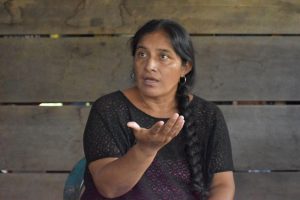The Alice Zachmann Human Rights Defender’s Award recognizes an individual, organization or community who has demonstrated a commitment to promoting respect for human rights, even when confronted by threats and violence. The award serves as a means to highlight the struggle of the recipient on an international level and aims to protect human rights defenders at risk of suffering acts of violence or other attacks. It is awarded in honor of Sister Alice Zachmann who founded GHRC in 1982, and directed the organization tirelessly over 20 years.
The recipient will be invited to a public recognition event where he/she will have the opportunity to give a speech regarding his/her work. Additionally, GHRC will accompany the recipient to advocacy meetings with governmental officials and/or other international solidarity organizations and represents a commitment from GHRC to provide ongoing support.
2023 Alice Zachmann Award: Judge Miguel Ángel Galvez
We are thrilled to announce that our 2023 Alice Zachmann Human Rights Award will go to Judge Miguel Ángel Galvez.
Judge Galvez has dedicated his illustrious career to the defense of justice and the rule of law in Guatemala as well as fighting corruption. In his work in the courts, Judge Galvez presided over several cases that were pivotal in fighting for democracy, judicial independence, and against impunity in Guatemala. He also played a crucial role in investigating and prosecuting former dictator José Efraín Ríos Montt who was the first former Guatemalan head of state to be convicted of genocide following the brutality of the civil war, as well as ordering the arrest of former president Otto Pérez Molin, currently being tried on corruption charges related to a major fraud scam.
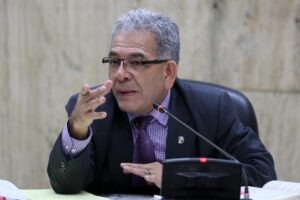
Since late 2022, Judge Galvez became victim of increased political persecution and criminalization by the state and its corrupt figures forcing Galzez into exile. Since then, he has worked tirelessly to raise awareness of the increasing backsliding of Guatemala’s democratic institutions and the rise in political persecution by the state’s major courts. He has also sought to highlight the difficulties exiles face once away from the immediate danger they face at home such as isolation and financial struggles.
Judge Galvez’s legacy is one of commitment to the principles that underpin a strong democracy and throughout his career, he has faced and mounted countless challenges, threats, and more but one thing has always remained; his unwavering determination to do what is right in the face of seemingly insurmountable odds. As such, it is a great honor to bestow the 2023 Alice Zachmann Human Rights Award on Judge Galvez.
2022 Alice Zachmann Award: Alcaldia Indígena De Nebaj & Chicoyoguito Resistance
We are excited to announce that our 2022 Alice Zachmann Human Rights Award will go to the Alcaldia Indígena De Nebaj and the Chicoyoguito Resistance

The Alcaldia Indígena De Nebaj, or Indigenous Mayor’s Office of Nebaj, has consistently fought for the rights of its Indigenous inhabitants both during and after the brutality of the dictatorships that disproportionately targeted and murdered indigenous Guatemalans. In addition to serving their communities as Indigenous Authorities, fulfilling their ancestral duties of providing assistance, justice, and more, they have recently engaged in critical investigations into corruption in the region. “This award is dedicated to those who have already given their lives to defend our rights and our property, to the grandparents who at some point carried out this work,” said Feliciana Herrera, the first female mayor of the B’oq’ol Q’esal Tenam Naab’a or Indigenous Mayor’s Office of Nebaj.
The 2022 Alice Zachmann Prize will also be awarded to the resistance of Chicoyogüito, Alta Verapaz, in honor of the people who once formed that community and were evicted by the Guatemalan army in 1968 to build military zone 21, which later became the scene of human rights violations during the internal armed conflict.
Olivia Sierra, president of the community’s Board of Directors and granddaughter of the residents who were evicted, said that after the signing of the Peace Accords, they began to reclaim their land, which was taken from
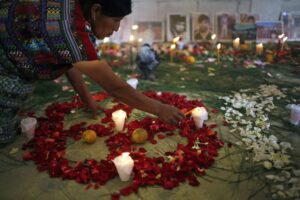
their parents and grandparents. To date, however, almost 14 years after they began their claim, they still have not been able to get the State to return their lands to them. Sierra argues that if the state does not want to return their parents’ land, they should give them another piece of land, since the people of that community, some 260 families, live in extreme poverty. Now they are not dying of disease, but of hunger, because they no longer have anywhere to survive, Sierra said.
GHRC is honored to present the 2022 Alice Zachmann Award to these courageous defenders of human rights and stands with them in their fight for justice.
2021 Alice Zachmann Award: El Estor Resistance
We are excited to announce that our 2021 Alice Zachmann Human Rights Award will go to The El Estor Resistance. Olga Marina Che will accept the award on behalf of the community in a celebration on December 14 at 7 pm EST. Please join us! The event will be virtual, and you’ll have the opportunity to talk with Olga Choc Che and GHRC staff.
In October of this year, Indigenous authorities, along with the Fisherman’s Guild in El Estor, established a peaceful resistance encampment to block supply trucks from accessing an illegal nickel mine that threatens their lives and the environment. The Fenix Mine, a contested project for decades, had been ordered to suspend operations following a 2019 Constitution Court ruling that found the Guatemalan Nickel Company had been illegally operating the mine since 2005, given that the company had failed to conduct a consultation process with the affected communities. The company, according to the Court’s order, would have to consult the impacted communities before resuming operations. The Guatemalan Ministry of Energy and Mines began the consultation process this fall, but excluded key communities, including the Fisherman’s Guild, which had filed the original lawsuit that led to the ruling. The El Estor Resistance is calling for a free and fair consultation process with all legitimate Indigenous communities whose health and livelihoods the mine affects. 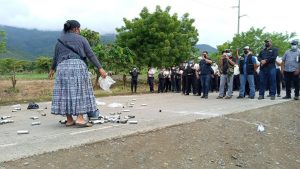
Because of their effective opposition to the mine, members of the El Estor Resistance are facing danger. On October 23, thousands of Guatemalan security forces violently cleared the encampment and escorted trucks to the mine, and President Giammattei declared a month-long state of siege, suspending basic constitutional rights, such as freedom of movement and assembly. The community is now under a “state of prevention,” which still entails the suspension of such rights, with the police, army, and navy present to enforce the crackdown. Security forces are specifically targeting members of the resistance. Community leaders and journalists are being followed and have been arbitrarily arrested and harassed. Many have had their homes violently raided by police. GHRC personnel have taken testimonies in El Estor and we are working to protect the targeted defenders. Please share in our acknowledgement of their courage as we present them the 2021 Alice Zachmann Award.
Olga Marina Ché is an indigenous maya Q’eqchi’ environmental and human rights defender. She serves as the treasurer of the Fisherman’s Guild and is a member of the Q’eqchi Council of Ancestral Authorities.
2017 Human Rights Defenders Award: COMUNDICH – Coordination of Associations and Communities for the Integral Development of the Cho’rti People
GHRC is proud to announce that the Coordination of Associations and Communities for the Integral Development of the Cho’rti People [COMUNDICH] has been chosen to receive the 2017 AliceZachmann Award for human rights defenders. COMUNIDICH will be represented in the award ceremony by Elodia Castillo Vasquez. Please join us on December 7, 2017 at 1822 R Street NW. Doors open at 6:30pm, program begins promptly at 7pm
Cho’rti communities in the municipalities of Camotan and La Union in the department of Chiquimula, along the border with Honduras, are renowned for extreme levels of poverty and malnutrition. Not only are Cho’rti lands arid, forming part of Guatemala’s ‘dry corridor’ but these vulnerable communities have been illegally pushed off their lands by local families using violence and corruption of the justice system. COMUNDICH is successfully pursuing lawsuits in national courts to recover land illegally taken from Cho’rti communities, and promote grassroots development projects so they may better feed their families.
Large landholders in the area often maintain Cho’rti lands under the control of heavily armed bands. In reaction to the defense of their lands, COMUNDICH communities are under constant attack. Over the past 10 years seven COMUNDICH leaders have been murdered, and in May of 2017, seven indigenous leaders organized in COMUNIDICH were arrested, and remain wrongly imprisoned. While the extreme levels of malnutrition and the area’s importance as a border region have made the Cho’rti region a focus of the Alliance for Prosperity, Cho’rti communities explain they are not a part of the development plans for the region and fear it will only deepen poverty by reinforcing illicit land holder’s interest in their lands.
2016 Human Rights Defenders Award: ECAP
The 2016 Award was presented to the Community Studies and Psychosocial Action Team. The ceremony took place on November 1st, 2016 at First Congregational United Church of Christ in Washington D.C..
GHRC selected ECAP for its commitment to providing healing services to survivors of human rights violations and sociopolitical violence, and its contributions to building a more just society. They work to provide treatment to those that have suffered human rights violations with a special focus on women and Indigenous people. Since 1998, ECAP has carried out psychosocial support for many victims and their family members.
Based on this experience, ECAP believes that survivors and their families must be supported during both the investigative period and throughout the documentation phase of violent actions. In addition, victims should be provided with the resources necessary to help them interpret the consequences and impact of violence and all its manifestations. ECAP’s work strives to reduce the impact of past, present, and future violence by advocating for justice, historic memory, and dignity.
Amongst it’s many accomplishments, ECAP is also a key member of the Alliance to Break the Silence and End Impunity – a multidisciplinary group of three Guatemalan organizations that have come together to support the women survivors of Sepur Zarco in their landmark case against former military personnel for sexual violence and slavery committed during Guatemala’s internal armed conflict. In February of 2016, this case made history by successfully trying sexual slavery as a crime against humanity —a first in the Americas for a case carried out in a national court. Read more about the Sepur Zarco trial here.
Leer en español aquí.
2015 Human Rights Defenders Award: Prensa Comunitaria
The 2015 Award was presented to Community Press (Prensa Comunitaria), and was accepted on behalf of Prensa member and community leader Lorenzo Mateo Francisco. The awards were presented by GHRC/USA on the 1st of November, 2015.
2014 Human Rights Defenders Award: The Guatemalan Human Rights Law Firm
The 2014 Award was presented to the Guatemalan Human Rights Law Firm (The Bufete de Derechos Humanos); a special posthumous award was also presented to Dr. César Barrientos. Both awards were formally presented by GHRC on October 28, 2014.
Read more about the 2014 Award recipients and event >
2013 Human Rights Defenders Award: UDEFEGUA
The 2013 Award was given to the Guatemalan Human Rights Defenders Unit (UDEFEGUA). The award was formally presented by GHRC on November 14, 2013 to Claudia Samayoa, coordinator for UDEFEGUA, who accepted the award on behalf of her organization.
2012 Human Rights Defenders Award: ‘La Puya’
The 2012 Award was presented to two communities in Guatemala, San José del Golfo and San Pedro Ayampuc (commonly referred to as ‘La Puya’), for their efforts to protect the environment against international mining interests.
